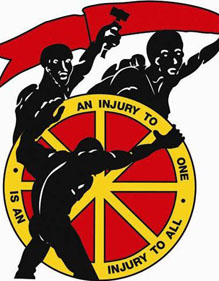
The survey was conducted with 753 non-union members and 2293 union members in urban communities with an average household income of under R12000. 1746 of the union members or over half the entire survey belonged to Cosatu affiliated organisations.
The survey largely replicates the 2006 Cosatu Workers’ Survey with questions on what workers want from their employers and unions; why non-members do not belong to unions; whether workers face racial or gender discrimination or harassment at work; their views on strike action; union services and union democracy and their political commitments.
Almost half of Cosatu members who alleged or saw corruption said it involved shop stewards selling out to management, the report read. Most corruption acts related to misuse of funds with members complaining that union leaders abused their pension funds and benefits and that shop stewards were bribed by management.
However, these allegations did not constitute corruption as normally understood but rather arose from the perception that union leaders were not serving members. In Cosatu, professionals and skilled production workers were more likely to say there was corruption than office workers were.
A document released by Cosatu affiliates such as the South African Democratic Teachers Union (Sadtu), National Union of Mineworkers (NUM)
and Democratic Nursing Organisation of South Africa (Denosa) titled Composite Resolutions to the 11th National Congress emphasised the dangers of corruption within the trade union movement stating that corruption eroded the confidence of the membership and society at large, it deterred the development agenda and that it is a cancer that destroys good governance and it is prevalent in both private and public sector.
and Democratic Nursing Organisation of South Africa (Denosa) titled Composite Resolutions to the 11th National Congress emphasised the dangers of corruption within the trade union movement stating that corruption eroded the confidence of the membership and society at large, it deterred the development agenda and that it is a cancer that destroys good governance and it is prevalent in both private and public sector.
“Corruption undermines the economic gains and reverses all the strides that seek to redress economic disparities of the past,” the report read.
“Corruption has its roots from those who have vested interest in trade and is inherent within the capitalist system as a whole.”
The report hailed Cosatu’s continued condemnation of the massive extent of corruption both in private and public sectors, the theft and waste of public funds.
The alliance highlighted that corruption within provincial departments has affected schools feeding schemes and its the reason textbooks and stationery were delayed in Limpopo.
“The state is not an avenue to dispense patronage for ‘jobs for pals’ and ‘tendes-for-favours’,” the report read.
“Corruption is tantamount to stealing from the poor and enriching the few.”
The alliance reaffirmed the 10th Congress and Central Committee Resolutions to fight against corruption, and also acknowledged efforts from the office of the public protector to curb corruption.
It called on government to avail more resources to projects that seek to fight corruption.
Leadership in the alliance and in government should declare their business interest including those owned by spouses and relatives, the report stipulated.
“Comrades must be encouraged to report and expose incidences of corruption vigorously and unapologetically, irrespective of rank, station or affiliation.”
Image
Excerpt
Union members allege there is corruption in their unions, but fewer than one in seven could ascertain they had personally experienced it, according to a Congress Workers’ Survey.
File Upload

